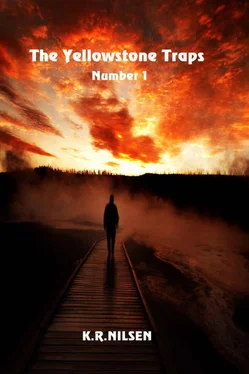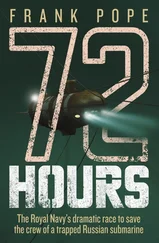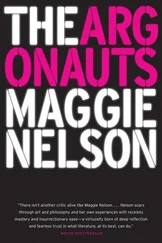Abel and Bobcat waited beneath the glass vault as every man, woman and child in the little town made their way down the steps into the greenery. They stood before a plank table covered with a sheet. The humid air smelled earthy, of the odor of compost and growing things. The temperature hovered just above seventy degrees. Penny and Winnie lifted the sheet over the table and busied themselves arranging whatever treasures lay beneath.
Harland and the tiny band of Sweetly émigrés stood in a little cluster to one side. Abel was pleased that they had healed well at Independency from their serious bout with pellagra. It had taken months for the shock of the loss of their loved ones, their little farm community, and their former life to dissipate, but the South Dakotans seemed noticeably more at ease in their new surroundings. Some were making real strides to attempt to integrate into the life of the village on the bluffs.
As the last citizens spread out in the greenhouse, Abel signaled to Oleg to throw the breakers and cut power to the grow-lights. The interior of the greenhouse plunged down to a dusky green. Abel turned to his longtime friend and nodded. Bobcat, donning his ministerial persona, led the community in an invocation.
“Hear us, Lord, we the few. Through your infinite mercy, you have seen fit to spare us the horrors of the Yellowstone cataclysm. ‘Why us?’ we ask. What have we done to deserve such a blessing, when all the peoples of the earth are diminished and many are failing to thrive?
“We are not nobler than others, more pure, more deserving. We must seem a motley band before your eyes. We do not even know how to address you as one or pray to you in unison. We are hardly devout. Yet you have set us aside to preserve our lives so that we may continue to do good work on this earth.
“We are humble in your presence this equinox morning, more so than at any time in the past. We rejoice in the increasing daylight, in the promise of warmer temperatures to come, in the miracle of growing things, and in the miracle of our very lives.”
Suddenly, a gleam—ruler straight rays of red sunlight pierced the glass and scattered into the foliage and faces. On the horizon, the ruby rim of the new day’s sun swelled on the eastern horizon. The citizens found their voices. A joyous cheer went up from every throat and filled the huge glass enclosure. The spontaneous outburst rent a toothy smile across Abel’s face.
“A miracle, indeed,” he murmured quietly.
Warm red gold washed through the greenhouse, casting the people in bronze and the plants in tones of freshly oxidized copper and chartreuse. Trapped beneath the glass, the warming rays of the sun quickly nudged the temperature up and freed random water molecules to further dampen the air.
The colony’s minister, marveling at the gilded light, raised his hands to heaven and called out, “Who wrote this script?” Laughter echoed through the building.
“I would like to conclude our little prayer by saying simply this: Thank you, Lord, for giving us a tiny corner of an immense universe, a tiny corner of a vast solar system, and a tiny corner of a blue planet to carry on. We will not fail you, as you have not failed us. Amen.”
“Amen,” from scores of throats.
Abel stepped forward and thanked Bobcat for his words. As Bobcat before him, he lifted his hands to the heavens, and there rose a clamor from the far end of the greenhouse. It was the drum and fife band, the little ragtag ensemble that had once called everyone to dinner on the first day of the Total Life Skills seminars. Lost in the strawberry foliage, the assembled could hear the band approach, drumming and piping and stomping the soft earth beneath. Suddenly, four mimes burst from the foliage, raced to the table, and stood at the four corners of it, stone still. The band emerged, banged its feet as one, and stopped.
At that, the mimes reached down to the cloth covering the table, and in unison, they lifted it away. Beneath lay a modest feast, with stakes of corn bread, crocks of New England-style baked beans, pans of potato pancakes, pots of herb tea, pitchers of goat milk and a wheel of cheese. At the center was a four-foot-long sheet cake, slathered with white icing and sporting filigrees of sliced strawberries and a garnish of strawberry leaves and flowers. Scrawled across the center of the cake were two words formed by the strawberry slices: ‘Wonderful Life’.
Abel brought his hands down and clasped them before his chest. “It’s time to break fast, good people. Take all you want, eat heartily. As for this grand cake, it represents the last of something and the beginning of something, as well. The cake was made with the very last of our wheat flour stocks. And it was whipped up with refined beet sugar that we scavenged. There may be no wheat for a good long while. As for the sugar in the icing, that will be the end of it. So think of the sugar in this cake as the passing of an era, as moving from one epoch to another, from one human system of organization to another completely different one. The old system is slipping away from us, yet our way of life has a bright future ahead, as bright as the sunlight streaming through the glass above us all.”
As the sun advanced into the heavens, the greenhouse warmed rapidly. Nibbling at their food and listening to Abel’s words, colonists stood about, soaking in the rising heat and humidity. Some closed their eyes and let the warmth cradle them gently and soak deep into their pores. After nearly six months of a brutal, record cold winter, the solar heat trapped by the glass seemed a great luxury.
Abel reached below the table and pulled up a large sign with the numerals one-seven-zero on it. He held it aloft and watched the crowd as all acknowledged the placard.
“We are more than one hundred strong at Independency. We have been that many since a few weeks after that terrible fall day. Remarkably, we have lost no one since. There have been no deaths and, really, few serious illnesses despite the ash and what is going on elsewhere around the nation. We are blessed. We really are.
“The spring equinox tells us that life renews itself endlessly. It reminds us that we must renew our efforts to create a just, self-sufficient, productive and peaceful society, one that lives within its means and in balance within the greater framework of the natural world.
“I would like to think that this great strawberry house will be our cathedral most Sundays, until the ravages of the Yellowstone disaster are spent and we can resume life as we knew it, outdoors in the fields and orchards. I had hoped that we might meet here indefinitely, among the strawberry towers, to celebrate our good fortune, our good life, our full life.”
Abel quieted down for a long pause and scanned the many. Vigor seemed to drain away from the man as silence filled the vast greenhouse spaces. He closed his eyes and rubbed the palm of his right hand into his flesh of his face. Many citizens looked up from their plates, sensing their founder was not quite himself.
Abel exhaled abruptly. “Good people, like the spring equinox, we must renew ourselves,” the town founder said flatly. “We cannot stay here on the bluffs much longer.”
Every eye fell upon Abel at once.
“When winter breaks and the lands to the west dry out, dust from the Yellowstone ashfall will blow into this community on the wind night and day. It will go on for years, decades, maybe even centuries until the prairie grasses and river bottom forests reestablish their hold on the Plains. The coming dust storms will be far, far worse than the Dust Bowl years of the Great Depression. We will simply have no choice but to leave.”
Amid a rising crescendo of howls, a shout among the strawberry towers rang out: “Where will we go?”
Читать дальше










